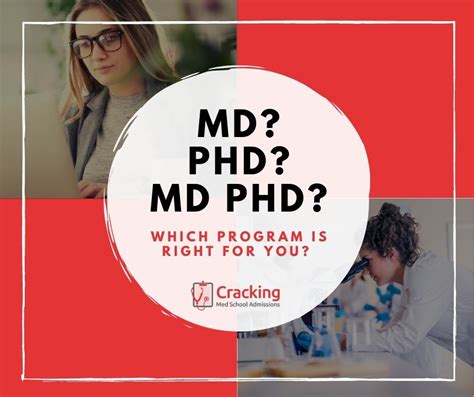What is an MD/PhD?
An MD/PhD is a dual degree program that combines a medical degree (MD) with a doctorate in a research field, such as biology, chemistry, or engineering. MD/PhD programs typically take 7-8 years to complete.

Why Get an MD/PhD?
There are many reasons to get an MD/PhD. Some of the benefits include:
- Increased research opportunities: MD/PhDs are eligible for a wider range of research funding opportunities than MDs or PhDs alone.
- More career options: MD/PhDs can pursue careers in both medicine and research.
- Higher earning potential: MD/PhDs earn higher salaries than MDs or PhDs alone.
How to Apply to an MD/PhD Program
The application process for MD/PhD programs is highly competitive. To increase your chances of acceptance, you should:
- Get a strong undergraduate education. MD/PhD programs typically require applicants to have a strong undergraduate education in science and mathematics.
- Get involved in research. Research experience is essential for MD/PhD applicants. Try to get involved in research projects as an undergraduate.
- Write a strong personal statement. Your personal statement should explain why you are interested in an MD/PhD program and what you hope to achieve with the degree.
- Get good letters of recommendation. Letters of recommendation should come from professors who can attest to your academic abilities and research experience.
MD/PhD Programs in the United States
There are currently 122 MD/PhD programs in the United States. These programs are located at a variety of universities, including Harvard University, Johns Hopkins University, and the University of California, San Francisco.
MD/PhD Programs in Other Countries
MD/PhD programs are also available in other countries, such as Canada, the United Kingdom, and Australia.
Common Mistakes to Avoid
There are a few common mistakes that MD/PhD applicants should avoid. These include:
- Not getting enough research experience. MD/PhD programs are highly competitive, and applicants need to have a strong research background.
- Not writing a strong personal statement. Your personal statement is your chance to sell yourself to the admissions committee. Make sure it is well-written and explains why you are a good fit for an MD/PhD program.
- Not getting good letters of recommendation. Letters of recommendation are essential for MD/PhD applicants. Make sure you get letters from professors who can attest to your academic abilities and research experience.
How to Step-by-Step Approach
Here is a step-by-step approach to applying to MD/PhD programs:
- Get a strong undergraduate education. MD/PhD programs typically require applicants to have a strong undergraduate education in science and mathematics.
- Get involved in research. Research experience is essential for MD/PhD applicants. Try to get involved in research projects as an undergraduate.
- Write a strong personal statement. Your personal statement should explain why you are interested in an MD/PhD program and what you hope to achieve with the degree.
- Get good letters of recommendation. Letters of recommendation should come from professors who can attest to your academic abilities and research experience.
- Apply to MD/PhD programs. The application process for MD/PhD programs is highly competitive. Make sure you submit your applications on time and put together a strong application package.
Why Matters
MD/PhD programs are essential for training the next generation of physician-scientists. Physician-scientists are able to bridge the gap between medicine and research, and they play a vital role in developing new treatments and cures for diseases.
How Benefits
MD/PhD programs offer a number of benefits, including:
- Increased research opportunities
- More career options
- Higher earning potential
If you are interested in a career in medicine and research, an MD/PhD program may be the right choice for you.
Tables
Table 1: MD/PhD Programs in the United States
| Rank | Institution | Location |
|---|---|---|
| 1 | Harvard University | Boston, MA |
| 2 | Johns Hopkins University | Baltimore, MD |
| 3 | University of California, San Francisco | San Francisco, CA |
| 4 | Stanford University | Stanford, CA |
| 5 | University of Pennsylvania | Philadelphia, PA |
Table 2: MD/PhD Programs in Other Countries
| Rank | Institution | Location |
|---|---|---|
| 1 | University of Toronto | Toronto, Canada |
| 2 | University of Cambridge | Cambridge, UK |
| 3 | University of Oxford | Oxford, UK |
| 4 | University of Melbourne | Melbourne, Australia |
| 5 | University of Sydney | Sydney, Australia |
Table 3: Common Mistakes to Avoid
| Mistake | Reason |
|---|---|
| Not getting enough research experience | MD/PhD programs are highly competitive, and applicants need to have a strong research background. |
| Not writing a strong personal statement | Your personal statement is your chance to sell yourself to the admissions committee. Make sure it is well-written and explains why you are a good fit for an MD/PhD program. |
| Not getting good letters of recommendation | Letters of recommendation are essential for MD/PhD applicants. Make sure you get letters from professors who can attest to your academic abilities and research experience. |
Table 4: How to Step-by-Step Approach
| Step | Action |
|---|---|
| 1 | Get a strong undergraduate education |
| 2 | Get involved in research |
| 3 | Write a strong personal statement |
| 4 | Get good letters of recommendation |
| 5 | Apply to MD/PhD programs |
